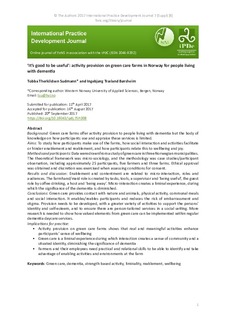| dc.contributor.author | Sudmann, Tobba Therkildsen | |
| dc.contributor.author | Børsheim, Ingebjørg Træland | |
| dc.coverage.spatial | Norway | nb_NO |
| dc.date.accessioned | 2019-03-28T11:22:29Z | |
| dc.date.available | 2019-03-28T11:22:29Z | |
| dc.date.created | 2017-12-21T14:35:53Z | |
| dc.date.issued | 2017 | |
| dc.identifier.citation | Sudmann, T. T. & Børsheim, I. T. (2017). ‘It’s good to be useful’: activity provision on green care farms in Norway for people living with dementia. International Practice Development Journal, 7(Suppl), 1-14. | nb_NO |
| dc.identifier.issn | 2046-9292 | |
| dc.identifier.uri | http://hdl.handle.net/11250/2592172 | |
| dc.description.abstract | Background: Green care farms offer activity provision to people living with dementia but the body of knowledge on how participants use and appraise these services is limited.
Aims: To study how participants make use of the farms, how social interaction and activities facilitate or hinder enablement and reablement, and how participants relate this to wellbeing and joy.
Methods and participants: Data were drawn from a study of green care in three Norwegian municipalities. The theoretical framework was micro-sociology, and the methodology was case studies/participant observation, including approximately 25 participants, five farmers and three farms. Ethical approval was obtained and discretion was exercised when assessing conditions for consent.
Results and discussion: Enablement and contentment are related to micro-interaction, roles and audiences. The farmhand/maid role is created by tasks, tools, a supervisor and ‘being useful’, the guest role by coffee drinking, a host and ‘being away’. Micro-interaction creates a liminal experience, during which the significance of the dementia is diminished.
Conclusions: Green care provides contact with nature and animals, physical activity, communal meals and social interaction. It enables/reables participants and reduces the risk of embarrassment and stigma. Provision needs to be developed, with a greater variety of activities to support the persons’ identity and self-esteem, and to ensure there are person-tailored services in a social setting. More research is needed to show how valued elements from green care can be implemented within regular dementia daycare services. | nb_NO |
| dc.language.iso | eng | nb_NO |
| dc.publisher | Foundation of Nursing Studies | nb_NO |
| dc.rights | Navngivelse-Ikkekommersiell 4.0 Internasjonal | * |
| dc.rights.uri | http://creativecommons.org/licenses/by-nc/4.0/deed.no | * |
| dc.subject | green care | nb_NO |
| dc.subject | dementia | nb_NO |
| dc.subject | strength-based activity | nb_NO |
| dc.subject | liminality | nb_NO |
| dc.subject | reablement | nb_NO |
| dc.subject | wellbeing | nb_NO |
| dc.title | ‘It’s good to be useful’: activity provision on green care farms in Norway for people living with dementia | nb_NO |
| dc.type | Journal article | nb_NO |
| dc.type | Peer reviewed | nb_NO |
| dc.description.version | publishedVersion | nb_NO |
| dc.rights.holder | © The Authors 2017 | nb_NO |
| dc.source.pagenumber | 14 | nb_NO |
| dc.source.volume | 7 | nb_NO |
| dc.source.journal | International Practice Development Journal | nb_NO |
| dc.identifier.doi | 10.19043/ipdj.7SP.008 | |
| dc.identifier.cristin | 1531099 | |
| cristin.unitcode | 203,3,60,0 | |
| cristin.unitcode | 203,3,11,0 | |
| cristin.unitname | Institutt for sosialfag og vernepleie - Bergen | |
| cristin.unitname | Institutt for ergo/fysio/radio - Bergen | |
| cristin.ispublished | true | |
| cristin.fulltext | original | |
| cristin.qualitycode | 1 | |

